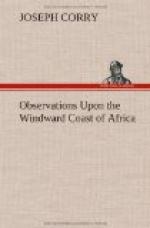In matters of less consequence they reckon with their fingers, by bending the little finger of the right hand close to the palm, and the other fingers in succession, proceeding to the left hand, concluding the calculation by clapping both the hands together; and if it requires to be extended, the same process is repeated.
Among the Foulahs in particular, commercial transactions are carried on with extreme tardiness; a palaver is held over every thing they have for barter. The season in which they chiefly bring their trade to the coast is during the dry months, and they generally travel in caravans, under the control of a chief or head man. The head man of the party expects to be lodged and accommodated by the factor, and before they enter upon business, he expects the latter to give him service, or a present of kola, Malaguetta pepper, tobacco, palm oil, and rice; if they eat of the kola, and the present is not returned, the head man begins the trade, by making a long speech, in which he magnifies the difficulties and dangers he has had to surmount, &c.; mutual interpreters report this harangue. The trade for rice is settled with little delay, but every tooth of ivory requires a new palaver, and they will dispute for a whole day for a bar with the most determined firmness.
When the palaver and trade is gone through, they again expect a present, and if they are pleased with the factor, they march off singing his praises, which they communicate to all they meet on the road.
The annual return from this commerce in colonial productions, has been from two to three millions sterling; for although large remittances have been made in bills to the African merchants, yet these bills have been provided for in produce by the planters. Politically considered, it will appear, that its regeneration might have been more appropriately the progressive work of time; and humanely viewed, it will also appear, from my subsequent remarks, that by those means alone the African can be freed from his shackles, and his condition efficaciously improved.
But to proceed with the intention of this chapter, I shall next make some remarks on the religion, customs, and character of the natives of the Windward Coast.
The natives on this part of the coast, and indeed throughout Africa, are in general extremely superstitious; they believe in witchcraft, incantations, and charms, and in certain Mahomedan doctrines, adopted from itinerant devotees and priests of that persuasion, who are numerous among them, and make a trade of selling charms. The Baggoes, Nellos, Susees, Timinees, &c. occasionally worship and offer sacrifices to the Devil, and are equally confused in their conception of the Supreme Being, of whose attributes they entertain an assemblage of indistinct ideas, of which it is impossible to give any clear description. They will tell the traveller with great apathy, “they never saw




